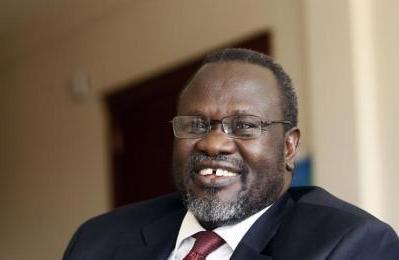South Sudanese opposition denies acting like government over creation of new states
October 9, 2015 (ADDIS ABABA) – A media official for the South Sudan’s armed opposition faction, SPLM-IO, under the leadership of Riek Machar, first vice-president designate, has dismissed accusations that it previously decreed 21 federal states and therefore had no moral ground to criticize president Salva Kiir’s similar recent unilateral decision to create 28 new states in the country.

Also, Gabriel Changson Chang, a breakaway senior official from Machar, issued a statement on Wednesday criticizing his former boss for what he called “hypocrisy” in rejecting the president Kiir’s decree, claiming that the opposition leader had made a similar decision in the past which he later on “shamelessly surrendered.”
Machar’s opposition faction however dismissed the claims, saying there was a difference in the manner in which the two rival top leaders presented their decisions.
“No, these are incorrect allegations. The manner in which we have proposed 21 federal states is different from the unilateral order by president Salva Kiir to create 28 states,” opposition leader’s spokesman, James Gatdet Dak, told Sudan Tribune in response to the allegations when contacted on Friday.
“The big difference is that unlike the regime our leadership in the SPLM/SPLA tabled the 21 states proposal during the peace negotiations in Addis Ababa. This was for the rival parties to deliberate on and adopt it. It is important to note that this was also done before the peace agreement was signed based on the existing 10 states,” he argued.
Dak said the order by the opposition leadership which established 21 federal states in both the opposition-held territories as well as in the government’s controlled areas served as “exemplary” of the administrative structures of federal system of governance which they wanted to be adopted by the parties at the peace talks for the country.
He maintained that their 21 states proposal remained the best option, claiming that it would also avoid or minimize border disputes and conflicts between communities as it is based on the former British colonial districts that have delineated borders as stood from 1 January 1956.
The opposition leader’s spokesman criticized the unilaterally decreed 28 states by the government, saying they are “tribally motivated” and a recipe for many border conflicts that would likely arise between communities due to lack of “recognized borders or historical basis.”
He also dismissed allegations that the opposition faction “surrendered” the 21 states proposal, explaining that the proposal will again be tabled in the upcoming constitution making process during the 30 months of transitional period before elections are held.
“We did not surrender the proposal. We tabled it before the parties throughout the negotiations. President Kiir’s regime rejected it. IGAD Plus also made the similar mistake by joining the regime in rejecting the proposal and scrapped it from the document which they finally imposed on the parties,” he said.
Now that the government had come back to its “senses late” by accepting the creation of more federal states, he said, the “abrupt” decision has become a surprise to all parties including the IGAD Plus mediation because the deal has already been sealed based on the 10 states.
He however commended the government for accepting creation of more federal states, although late, adding Juba should therefore suspend the presidential order on 28 states and keep it as a “counter-proposal” to be presented in the permanent constitution making process in accordance with the peace agreement.
“I see the new 28 states as a counter-proposal which president Kiir may present in the upcoming constitution making process. We shall also table the 21 federal states,” he said.
Earlier, the opposition said the unilateral creation of the states was in violation of the peace agreement signed in August on the basis of 10 states.
Likewise, South Sudanese opposition parties, former detainees, civil society organizations and the international community at large condemned the order by president Kiir, saying he violated both the constitution and the peace deal and called on him to suspend the decision and follow the mechanisms towards federalism which are provided for in the accord.
Article 162 in the South Sudan Transitional Constitution, 2011, prohibits that “the President shall not make any provisional order on matters affecting the Bill of Rights, the decentralized system of government, general elections, annual allocation of resources and financial revenue, penal legislation or alteration of administrative boundaries of the States.”
It also stipulates that the territory of the Republic of South Sudan is composed of 10 states. The constitution only provided for the Council of States to legislate laws that may alter the number of states, change their names and of their capitals or alter boundaries in accordance with initiative from the state concerned.
The government however maintained that it would continue with the implementation of the decree, saying the decision neither violated the country’s transitional constitution nor the peace deal.
Observers with knowledge in the South Sudanese peace process say the sudden U-turn by the government from rejecting the creation of more states during the peace talks to accepting it after the peace agreement has been signed could merely be based on the desire to claim credit for the creation of the federal states.
(ST)
